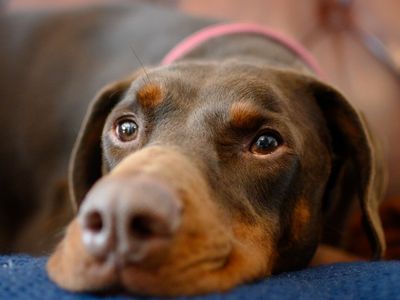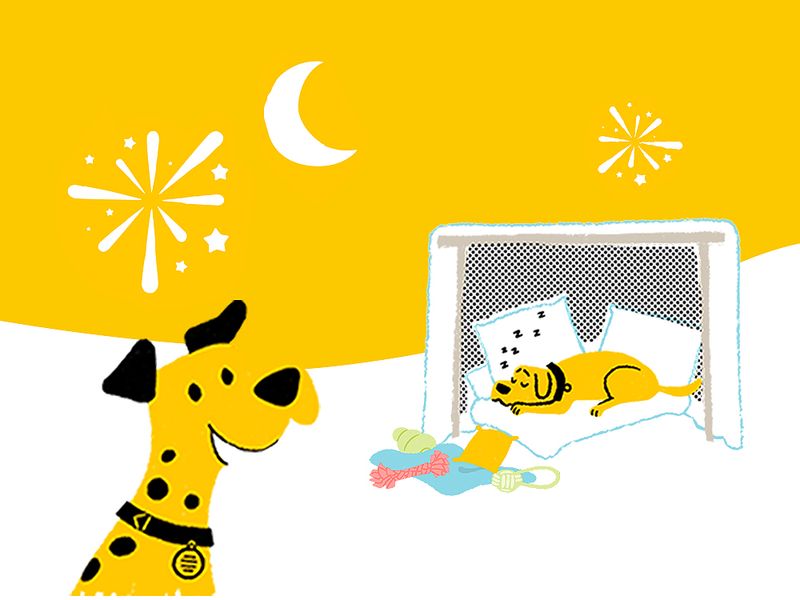
Fireworks are coming, prepare ahead
Fireworks can be distressing for dogs. Prepare ahead to help your dog cope this season and beyond.

Loud or unexpected noises, like fireworks, can be really scary for our four-legged friends. Almost half of owners say their dog reacts to loud noises with signs of fear and anxiety.
The best thing you can do to make fireworks less stressful for your dog is to prepare ahead. And for young dogs, you can take steps to reduce the chance they ever develop fireworks fear.
Keep reading for expert advice on getting ready for fireworks.
Have whizzes and bangs already started?
Get advice on how to support your dog during fireworks.

How to prepare for fireworks
Make a plan and adjust your schedule
- Find out when fireworks are likely to go off in your area. Research local fireworks displays, check neighbourhood groups on social media, and talk to your neighbours to see if they’re planning on having fireworks in their gardens. Let them know how fireworks affect your dog and what you’re doing to help them.
- Arrange your plans around key fireworks dates. When scary sounds are likely, like on Bonfire Night and Diwali, make sure you, or someone your dog knows well, will be at home with them.
- Adjust your walking routine. Plan your walks to make sure your dog is indoors before dark when fireworks are likely. You might also want to feed your dog earlier, to give them time to eat and go to the toilet before dark.
Use our free, downloadable action planner to plan what to do and when:
Make your home safe for your dog
- Prepare your home. Seal any gaps in windows and doors to reduce outside noise. Dogs can try to run away if they’re scared so check your doors, windows and fences are secure. Make sure their microchip details are up to date, just in case.
- Give your dog their own safe space. Make sure your dog has a snug and comfy space they can retreat to if they’re scared. Introduce this ahead of fireworks so your dog learns it’s a positive place to be. Find out more about creating a safe space for your dog.
- Prepare their favourite treats and games. Long-lasting treats can help distract your pooch and keep them happily occupied. Lick mats with dog-safe peanut butter are a popular choice. Experiment with different enrichment to find out what treats, games and puzzles your dog enjoys the most. But once fireworks start, give your dog the choice — if they’re scared, they may not want to play.
Talk to your vet
If you know your dog shows signs of fear of fireworks, make an appointment to see your vet as soon as possible. They can check if there are any medical problems contributing to your dog’s fear of noises.
Your vet may refer you to a clinical behaviourist. If you need extra support, you can also call our free Behaviour Support Line for expert advice.
If it’s right for your dog, your vet may give advice on additional treatments like medication which can be useful to help them cope during fireworks and stop their fear escalating.
Learn the signs your dog is stressed
Understanding what works for your dog, will help you support them throughout the firework season. Find out more about reading your dog’s body language.
These are just some of the ways your four-legged friend may respond to fireworks and loud noises:
- Vocalising more than usual like barking, growling, whining and crying
- Jumping up at you or someone else
- Dribbling, drooling and panting
- Holding tail down between their legs
- Hiding or trying to hide
- Pacing
- Not wanting to eat
- Salivating or lip licking
- Pulling or running away.
If your dog shows any of these signs, read our advice on supporting your dog during fireworks.
Preparing your puppy for fireworks
Help your puppy feel relaxed and confident around different sounds
To reduce the chances of your puppy developing a fear of noises, gradually and positively introduce them to a wide range of sounds. Our research shows that introduction to loud sounds is best done during puppyhood and is especially helpful for puppies that are 13 weeks of age and younger.
Before you get started, make sure you can recognise signs of fear or anxiety in your dog. If you see any of these signs, you know you’re progressing too quickly and need to slow down.
You can use sound recordings to get your puppy accustomed to loud noises. Check out our sound therapy recordings, specifically the ‘Sounds Scary’ track.
For puppies who are experiencing fireworks for the first time, plan fun activities to enjoy together. This will help strengthen your bond and make nights inside a positive experience. Check out our ideas for fun nights in with your pooch.
You can use sound recordings to get your puppy accustomed to loud noises. Check out our sound therapy recordings, specifically the ‘Sounds Scary’ track.
For puppies who are experiencing fireworks for the first time, plan fun activities to enjoy together. This will help strengthen your bond and make nights inside a positive experience. Check out our ideas for fun nights in with your pooch.
Make lasting change for all dogs
We know how stressful fireworks season can be for you and your dog. That’s why we are urging the Government to review current fireworks legislation and introduce simple, sensible changes to protect dogs from unnecessary distress.
We want:
- Fireworks to be limited to licensed, public events at specific times of year
- Local authorities to consider animal welfare when granting licenses for public displays
- Further noise level restrictions, down to 74 dB to reduce the number of animals affected.
After 14 months of campaigning, we’ve already made progress. A Firework Control Zone has been secured beside our Glasgow rehoming centre, protecting over 60 dogs from distress during fireworks season. But we need your help to go further.
Write to your MP about fireworks legislation today, and you can help us push for legislation that makes fireworks safer for dogs and more predictable for everyone. It only takes a few minutes to make a big difference.
Together we can make a difference.




